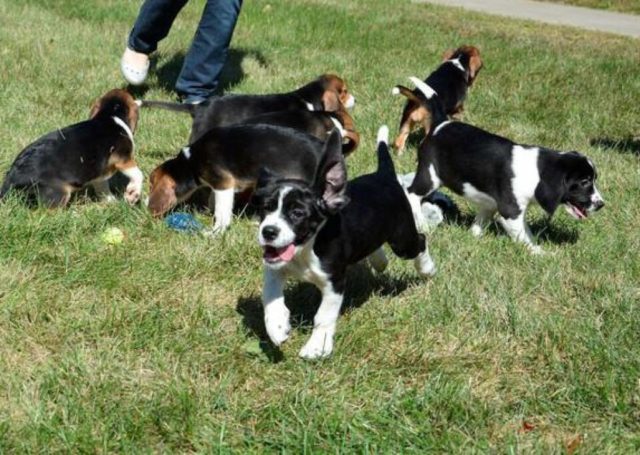Dr Anna Marais, Associate Dean of the University of Namibia School of Veterinary Medicine, says dogs have 300 million smell receptors in their noses, while humans only have about 5 million.
MEDICAL detection dogs are already trained to spot the scent of malaria, cancer and Parkinson’s disease. So, could dogs be used to sniff out Covid-19?
In early 2020, at the start of the Covid-19 pandemic, a litter of beagle puppies was born at UNAM School of Veterinary Medicine (SoVM). Although unrelated, these events would prove fundamental to the start of the Namibia Detection Dog Project.
Dr Anna Marais, Associate Dean of the University of Namibia School of Veterinary Medicine, says that dogs have 300 million smell receptors in their noses, while humans only have around five million.
More active genes that code olfactory data make dogs’ sense of smell hundreds of times more powerful than that of humans.
The anatomy of the dog skull also provides a lot of space for these molecules to attach to the smell receptors.
Research institutions and veterinary schools in many countries around the world, including France, Finland, the UAE, and the UK had already embarked on Covid-sniffing dog projects. In Namibia, this litter of beagle puppies from the existing colony at UNAM’s SoVM would provide the “noses” for launching Africa’s first Covid-sniffing dog pilot project.
Dr Guy Fyvie, Veterinary Advisor at Hill’s Pet Nutrition says that this project was a natural fit for the company to partner with, whose foundation is built on transforming lives.
“We are excited to be part of this revolutionary work, as well as helping to find an affordable and feasible way of detecting this virus and potentially others in the future.” In addition to looking after the nutritional needs of all the dogs in the programme, Hill’s has donated over R100,000 to the project in Namibia.
SoVM veterinarians identified an experienced dog trainer to work on the project and enlisted the support of four volunteer dog handlers including a veterinary nurse, a veterinary para-professional, a post graduate student and the theatre assistant from the SoVM’s staff to start with the obedience training of four dogs.
Simultaneously, the Dog Detection Trust was established, with Justice Dave Smuts, Dr Solomon Amadhila and Dr Conrad Brain as founding members, and a goal of sharing information with international researchers and raising funds to build and equip a dedicated dog detection training unit.
Using an interim facility at the SoVM and a smooth sample collection procedure, the trainers and dogs moved from obedience training to smell detection.
A day starts with a bonding session between dogs and dog handlers and trainer, providing a chance to refresh aspects of basic obedience training, familiarisation with surroundings and specific dog/handler bonding including the understanding of body language between the two.
After an intense period of sniffer training, the dogs are taken out to relax and socialise in the surrounding farmlands. Plus, the dogs are familiarised with different buildings, people, and situations they may encounter in their future training or deployment.
Marais says that the results from the pilot project, Covid-19 sniffing results, to date, are promising and indicate a similar pattern as those emerging from collaborative projects abroad, with the SoVM dogs presently able to identify well over 80% of the samples correctly.
“This indicates that dog detection of Covid-19 could potentially be an affordable and reproducible method in the detection of the virus and control thereof, especially in low-income countries with limited lab space.”
The Detection Dog Training Facility is complete. Covid-19 sniffing training continues, when samples permit, while other dogs are being trained to detect wildlife products, narcotics, and explosives.
Dr Fyvie says that hard-working dogs need additional energy, protein, and fats to be able to perform at their very best and therefore a food that works with the pet’s biology and activity level is vital.
“Considering the diverse workload imposed on these dogs, it is imperative that we look after their physical and mental health. We consider Hill’s essential to achieving this. As results have shown, the potential impact these dogs could have in helping to manage the handling and future course of the Covid-19 pandemic, their health is vitally important,” Marais says.








